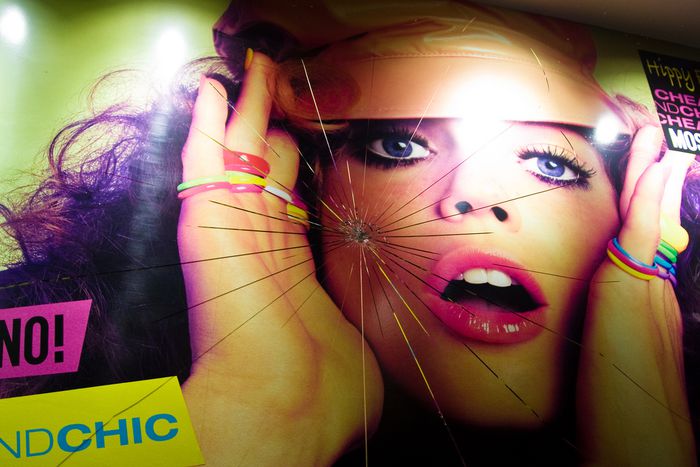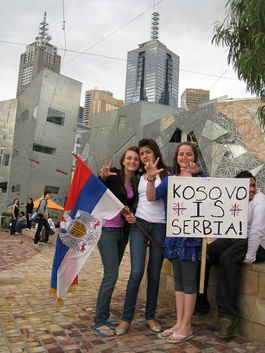
Serbia: football violence, gay pride violence, anti-west violence?
Published on
Translation by:
Cafebabel ENG (NS)‘The Serbs are experts at shooting themselves in the foot,’ said interior minister Ivica Dacic, after the world watched Serbs riot in the streets of Belgrade and later, Italy. Is it all down to an extreme right burgeoning fear of the west?
Burning bins, broken windows and masses throwing stones at the police: these were the images defining Serbia’s negative headlines over the last few days. The Belgrade government reaffirm that the country’s national security is not being compromised. But no-one in Serbia believes that it’s only about the violence of ultranationalist thugs; experts suspect that the country’s democrative development is being weakened. The outcome of the terror of recent days has thrown dark shadows on Serbia.
Protests galore
There were massive protests with police at the gay pride parade in Belgrade, with 6, 000 protestors leaving over 150 hurt and causing millions of euros of property damage. Only two days later the Euro 2012 qualifying match between hosts Italy and Serbia was cancelled after seventeen fans were arrested, having attacked their own goalkeeper Vladimir Stojkovic, delayed the match by forty minutes and thrown flares onto the pitch. This time the Serbian thugs made it into the European news on European soil.
In the future there will be tougher actions against such groups and their financers to find out who is behind them – that’s how president Boris Tadic’s national security advice goes, in any case. Media speculation that the ruling democratic goverment has been weakened by the riots have actually helped debilitate the supposed ringleader of the affray in Genoa. He has since revealed that his motives were not political. ‘We don’t have enough information, we don’t even know who else was involved in the riots,’ admitted the interior minister Ivica Dacic on the Belgrade radio station B92.
Critical voices
There are some critical voices though. ‘No-one in Serbia believes that the protests were spontaneous,’ says Belgrade-based psychologist Prvoslav Plavsic. This at least is not since it became known that Slobodan Milosevic’s ousting a decade ago was also planned and funded from abroad. The hooligans in the street remain mere puppets of a badly staged PR-strategy. ‘Whoever is responsible for all of this - whether it’s the political crises, lobbyists, sportclubs or others – are still unknown,’ says Plavsic. Maybe someone is interested in weakening the state institutions of the country and slowing the correspondening democratic developments with it.
'Serbian youth today is very unsatisfied'
However, the heavy mediatisation of the hooligans doesn’t help draw exact conclusions. ‘Most Serbs are embittered by the events. Only a small group of mostly young people are under the magnifying glass here,’ says Plavsic. ‘Serbian youth today is not aggressive but very unsatisfied.’ The difficult social and economic situation of the country doesn’t help. Since the political overthrow ten years ago much has admittedly been done, but the younger generation haven’t yet needed that. ‘There are as many pensioners as employees and few positions or perspectives for young people,‘ says Plavsic.
 Belgrade journalist Slobodan Georgijev adds that this younger generation is prone to extreme nationalist propaganda. He’s been working on the issues of nationalist violence for years. ‘Many people are frustrated, have never been abroad and don’t even know what the European Union is. It’s thus easy to manipulate them with radical ideas.‘ Three of the most famous ultranationalist groups in Serbia are Nationalni Stroj (‘national alignment’), the Serbian national movement 1389, Obraz and Dveri. The linking thread between the groups is the rejection of the EU, Nato and other western influences which could endanger ‘Serbianness’. Other ultranationalist groups arise out of radical football fan gangs or even ultrakonservative theology students, says Georgijev, who works for the liberal Serbian weekly Vreme ('Time‘).
Belgrade journalist Slobodan Georgijev adds that this younger generation is prone to extreme nationalist propaganda. He’s been working on the issues of nationalist violence for years. ‘Many people are frustrated, have never been abroad and don’t even know what the European Union is. It’s thus easy to manipulate them with radical ideas.‘ Three of the most famous ultranationalist groups in Serbia are Nationalni Stroj (‘national alignment’), the Serbian national movement 1389, Obraz and Dveri. The linking thread between the groups is the rejection of the EU, Nato and other western influences which could endanger ‘Serbianness’. Other ultranationalist groups arise out of radical football fan gangs or even ultrakonservative theology students, says Georgijev, who works for the liberal Serbian weekly Vreme ('Time‘).
Besides, ultranationalists dispute a moderate policy against the EU and Kosovo. ‘They get support from radical clergies and call homosexuality an illness,’ finishes Georgijev. On the streets of the Serbian capital during gay pride on 10 October, they all stood shoulder to shoulder: football hooligans, organised crime group members and ultranationalist groups. The interior minister Dacic has called it a stew of different influences.
The author of this article, Veronika Wengert, is a member of the German writer’s network n-ost
Images: (cc)lassi.kurkijarvi; Kosovo (cc) peregrinaro/ both courtesy of Flickr; video: ©Associated Press/ Youtube
Translated from 'Kompott' aus Serbien: Hooligans, Gay Pride und die Angst vor dem Westen



